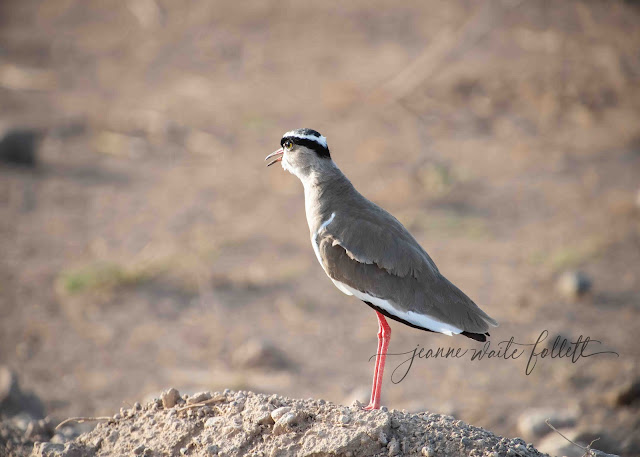Chapter 10:
Road Blocks and Traffic Jams
They aren't roadblocks. They're signposts."
Richie Norton
Today is our final full day at Tawi Lodge and Amboseli National Park. We ask to go back to the lake by the airstrip. After all the death we've seen because of this horrid drought, we need to be with the teeming wildlife at the lake.
The day is packed full of animals and adventures, so I will have to split the fun into two or three posts. So, let's get on with it.
We have a little trouble getting there. There are a few traffic jams and a couple roadblocks slowing us down.
We are roughly a mile into the park when we come upon a crowned lapwing screaming at us from the berm alongside the dirt road. I am pretty sure this is the same lapwing whose chick we rescued from the middle of the road on our first day and I wonder why it's still screaming.
I look around and see four tiny things scurrying around and decide our little one survived. As we watch, our driver Benjamin spots five cheetahs farther off the road under a bush.
They have a kill there and have eaten. Now, bellies full, some are resting. The four cubs are within months of independence, when the males will strike out of their own. The females tend to stay with their mother longer. Mum cheetah has done an excellent job raising her cubs this long. Cheetahs are exceptionally vulnerable to being killed by other animals.
When we stopped, it was only our three vehicles. I look around and we are now in a scrum of safari vehicles, their drivers jockeying for the best positions.
 |
| Behind us. |
 |
| In front of us. Where did they all come from? |
We watch a few minutes longer and it's apparent the cheetahs are down for a rest, so I suggest we move on and let others have a front row view. That means we have to get out of three-deep vehicles, but Benjamin manages very well and we drive on.
A short time later, a herd of elephants on the move against a vast panorama gets our attention. Benjamin pulls over and angles the vehicle so we can get photos of the elephants coming toward us.
Other vehicles arrive and park a distance behind us, perhaps leaving room for the elephants to cross the road between us. The elephants decide otherwise, and cross between them and other vehicles behind them.
Then, just before the lake area we run into a traffic jam. The place is full of private cars, ranger trucks, and safari vehicles. It takes a while to maneuver through them. In the midst of all that is a mob of bicyclists, most wearing identical jerseys. Some event is about to get underway.
We pass them and continue up the narrow road along the water. Soon, the cyclists start going past us and I suggest we stop and let them go by. They travel a lot faster than we do because they aren't stopping to take photos.
Eventually, they are front of us.
 |
| Marabou storks watching the cyclists go by. |
All is well, and we are left to drive as slowly as we want and to enjoy the wildlife in and around the lake.
We do, however, have one final road block when we begin the journey out of the park:
 |
| You hate to make these poor wildebeest move off the road. So, you stop and let them move at their speed. |
 |
| The effects of starvation. |
Although, a herd of giraffe could have caused another road block on the way home, we turned off before our paths intersected.
And it was clear driving back to the park entrance.
***

















Quite a variety in this post: traffic jams, people, various animals and bird life. The picture of the very thin and starving wildebeast is heartrending. Climate change is becoming brutal. We are grateful you were able to see Africa in previous trips when it was not so challenging with their present drought. Hugs, Patti and Cap
ReplyDeleteUnfortunately, drought is nota recent challenge inAfrica. It’s been happening for decades.
DeleteI finally managed to find time to read about your African adventure. What a fantastic and amazing trip so far. Beautiful photos and narration as usual. What a thrilling thing to visit with Craig. It is unfortunate that there are so few super tuskers left. Between the drought and the poachers, they may eventually disappear from existence. I enjoy seeing the variety of birds and animals that Africa has to offer.
ReplyDeleteGood to see you here, Bud.
Delete